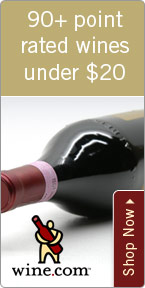The Bottom Line On The Cost Of Wine

Wednesday - April 21, 2010
| Share
 Del.icio.us
Del.icio.us
|
Wines come at almost any price. Does anyone remember Two Buck Chuck? I remember being in a French grocery store and seeing a bottle of wine for one Euro. (No, I didn’t buy it. Although I should have to see what it tasted like.) They can also be as expensive as a car, worth $10,000 and more.
So what can make a wine so expensive? How do these wines get priced and why can they be worth so much? They are, after all, just fermented grape juice, right?
First, let’s look at production costs, beginning with the land. An acre of land can cost anywhere from $5,000 to $1.5 million per acre. That’s a big difference. Then you factor in the cost of farming it. Depending on where you are and the source of labor, the prices can vary significantly. The price of equipment, fertilizer/pesticide as well should be factored in. And don’t forget that your yield can be different with each vintage because of the vagaries of nature.
OK, now you have a winery or someplace you can make the wine. How much do you want to spend on that? What type of equipment you purchase all goes into the bottom line.
Storage is at a premium. Where are you going to age your wines? Will the cellar be big enough or not?

|
Then you have to get all the bottles, corks, labels to make the wine stand out in a crowd.
Don’t forget the winemaker, assistant winemaker and the pickers during harvest. They need to eat and drink too. Some winemakers drink and eat better than others.
All of these factors can have varying degrees of severity, which leads to the diversity of prices for wine.
Now think about supply and demand. Economists have the classic graph with two lines in the basic form of an X. One line or curve is for demand and the other for supply. As the supply curve goes down, the demand curve goes up, and they meet at only one point. That point on the price scale is different for each wine. For a “no name” or perhaps “new” brand, that price point is usually fairly low. But with more established wineries that have history, higher scores, better winemaking, better terroir and/or better marketing, that price will go up.
(I forgot to add the price of marketing, too.)
Let not denial cover our eyes. The market is not the only factor in the way that wines are priced. Yes, there are many wines that are priced according to the price of their neighbors. “My vines are just next to his, so I can charge the same price,” is what they think. It does-n’t matter to them that they over-crop their vineyards and don’t take as good care of their wines. They feel entitled to it. The over-inflated ego can certainly drive the price up.
Call it what it is - greed. Yes, greed also can influence the price of a wine. The amount that one person will mark up the wine will be different from others. At every level of our three-tiered system there can be those swayed by the almighty dollar. You can see it on the Internet very easily. If you try to find a bottle of wine, you will see just how disparate some wines can be. I’ve seen the same wine offered for anywhere from between $199 all the way to $500 - for the same bottle! Don’t these people check out the Internet themselves?
In the end, the market will correct how wines are priced. If the price is too high for its quality, it will not sell. Conversely, the price of a wine will rise until it finds the point where no one will buy it. Wine will sell at any price only if there are consumers willing to spend the money on it, no matter how much that amount is.
Recommendations: NV Camille Saves Brut ($55) my new found “fave” Champagne is from the Grand Cru village of Bouzy; it sings with gorgeous fruit and ends with a complex and intense flavor. 2008 Pascal Jolivet Pouilly Fume ($25) this has an awesome nose of guava and grapefruit. It is so lively and refreshing with a decadent citrus tanginess that grips your palate.
Roberto Viernes is a master sommelier. E-mail .(JavaScript must be enabled to view this email address)
E-mail this story | Print this page | Comments (0) | Archive | RSS Comments (0) |
Most Recent Comment(s):












